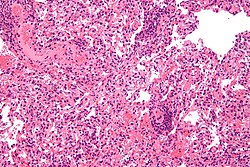Transplant rejection

Editor-In-Chief: Prab R Tumpati, MD
Obesity, Sleep & Internal medicine
Founder, WikiMD Wellnesspedia &
W8MD's medical weight loss NYC, sleep center NYC
Philadelphia medical weight loss and Philadelphia sleep clinics
| Transplant rejection | |
|---|---|

| |
| Synonyms | N/A |
| Pronounce | N/A |
| Specialty | N/A |
| Symptoms | Fever, graft dysfunction, pain at transplant site |
| Complications | Graft failure, chronic rejection |
| Onset | Varies (can be acute or chronic) |
| Duration | Varies |
| Types | Hyperacute rejection, Acute rejection, Chronic rejection |
| Causes | Immune response against transplanted organ |
| Risks | HLA mismatch, non-adherence to immunosuppressive therapy |
| Diagnosis | Biopsy, blood tests, imaging studies |
| Differential diagnosis | N/A |
| Prevention | N/A |
| Treatment | Immunosuppressive drugs, plasmapheresis, antibody therapy |
| Medication | N/A |
| Prognosis | Depends on type and severity |
| Frequency | Common in transplant recipients |
| Deaths | N/A |
Introduction[edit]
Transplant rejection is a physiological response wherein the recipient's immune system identifies and attacks the transplanted tissue or organ, perceiving it as a foreign entity. It is a common challenge in the field of transplantation medicine and can have severe implications for the recipient.

Understanding the Immune Response[edit]
The human body has a robust immune system designed to ward off foreign invaders such as bacteria, viruses, and other pathogens. However, this system can also recognize transplanted organs or tissues as foreign, leading to rejection.
Types of Rejection[edit]
Transplant rejection can be categorized into several types based on the onset and severity:
- Hyperacute Rejection: Occurs within minutes to hours post-transplant. It is primarily due to pre-existing antibodies in the recipient against the donor tissue.
- Acute Rejection: Emerges days to weeks after the transplant. It's the most common type and is mainly caused by T cells of the immune system.
- Chronic Rejection: Manifests over months to years and is less understood. It is believed to be an antibody-mediated response leading to gradual loss of graft function.
Reducing the Risk of Rejection[edit]
Molecular Compatibility[edit]
One of the primary strategies to reduce the risk of transplant rejection is to ensure molecular compatibility between the donor and the recipient. This is achieved through:
- HLA Typing: A test that identifies the human leukocyte antigen (HLA) molecules on the cells of both donor and recipient. A close HLA match can significantly reduce the risk of rejection.

Immunosuppressive Therapy[edit]
Post-transplant, recipients are typically prescribed immunosuppressant drugs. These drugs:
- Dampen the immune response, reducing the risk of rejection.
- Require careful monitoring, as they can lead to increased susceptibility to infections and other side effects.
Conclusion[edit]
Transplant rejection is a complex interplay between the graft and the recipient's immune system. With advancements in molecular testing and the development of effective immunosuppressants, the outcomes for transplant recipients have substantially improved over the years. Still, continuous research is vital to further understand the mechanisms of rejection and devise strategies to prevent it.
Ad. Transform your life with W8MD's Budget GLP-1 injections from $49.99


W8MD offers a medical weight loss program to lose weight in Philadelphia. Our physician-supervised medical weight loss provides:
- Weight loss injections in NYC (generic and brand names):
- Zepbound / Mounjaro, Wegovy / Ozempic, Saxenda
- Most insurances accepted or discounted self-pay rates. We will obtain insurance prior authorizations if needed.
- Generic GLP1 weight loss injections from $49.99 for the starting dose of Semaglutide and $65.00 for Tirzepatide.
- Also offer prescription weight loss medications including Phentermine, Qsymia, Diethylpropion, Contrave etc.
NYC weight loss doctor appointmentsNYC weight loss doctor appointments
Start your NYC weight loss journey today at our NYC medical weight loss and Philadelphia medical weight loss clinics.
- Call 718-946-5500 to lose weight in NYC or for medical weight loss in Philadelphia 215-676-2334.
- Tags:NYC medical weight loss, Philadelphia lose weight Zepbound NYC, Budget GLP1 weight loss injections, Wegovy Philadelphia, Wegovy NYC, Philadelphia medical weight loss, Brookly weight loss and Wegovy NYC
|
WikiMD's Wellness Encyclopedia |
| Let Food Be Thy Medicine Medicine Thy Food - Hippocrates |
Medical Disclaimer: WikiMD is not a substitute for professional medical advice. The information on WikiMD is provided as an information resource only, may be incorrect, outdated or misleading, and is not to be used or relied on for any diagnostic or treatment purposes. Please consult your health care provider before making any healthcare decisions or for guidance about a specific medical condition. WikiMD expressly disclaims responsibility, and shall have no liability, for any damages, loss, injury, or liability whatsoever suffered as a result of your reliance on the information contained in this site. By visiting this site you agree to the foregoing terms and conditions, which may from time to time be changed or supplemented by WikiMD. If you do not agree to the foregoing terms and conditions, you should not enter or use this site. See full disclaimer.
Credits:Most images are courtesy of Wikimedia commons, and templates, categories Wikipedia, licensed under CC BY SA or similar.
Translate this page: - East Asian
中文,
日本,
한국어,
South Asian
हिन्दी,
தமிழ்,
తెలుగు,
Urdu,
ಕನ್ನಡ,
Southeast Asian
Indonesian,
Vietnamese,
Thai,
မြန်မာဘာသာ,
বাংলা
European
español,
Deutsch,
français,
Greek,
português do Brasil,
polski,
română,
русский,
Nederlands,
norsk,
svenska,
suomi,
Italian
Middle Eastern & African
عربى,
Turkish,
Persian,
Hebrew,
Afrikaans,
isiZulu,
Kiswahili,
Other
Bulgarian,
Hungarian,
Czech,
Swedish,
മലയാളം,
मराठी,
ਪੰਜਾਬੀ,
ગુજરાતી,
Portuguese,
Ukrainian


